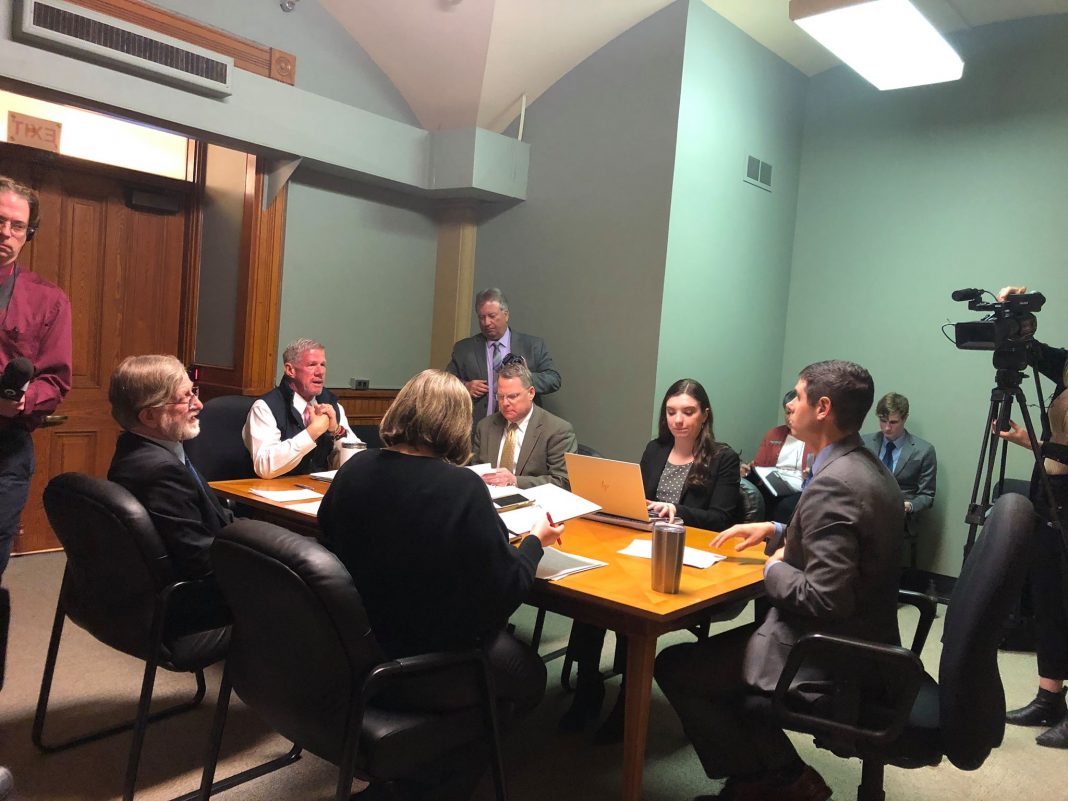A bipartisan effort needs some work but was good enough to receive approval from a Senate subcommittee on Tuesday. Senate File 2058 was filed by Senators Nate Boulton and Brad Zaun.
It relates to the compensation of athletes enrolled at postsecondary educational institutions. The postsecondary educational institution includes a regents institution, community college or private postsecondary educational institution in Iowa.
The bill allows college athletes to earn compensation as a result of the use of an athlete’s name, image or likeness. A trust would be established for the athlete.
“We’re wanting to see Iowa do its part to protect our student-athletes,” Boulton said. “As we look at what’s going on in major college sports, more and more money is infused into a system that has created two real outlets for that money — coaches salaries and facilities.”
With the addition of sports gambling, more money will go through the system, Boulton said.
“That system is isolated away from the student-athletes who are putting their bodies on the line and putting in all the hours every week in practice and doing all the things it takes to perform on that field that is really generating this influx of money,” Boulton said. “The NCAA model has embraced this influx of money, but not reacted to the inequities that it has caused.”
Other states, such as California, have passed legislation reacting to protect student-athletes. Boulton said the legislation is designed to treat student-athletes the same as other students, allowing them to have their own name, image and likeness, and to market themselves.
The money will be put into a trust account to protect student-athletes. Once they complete their eligibility or choose to no longer play, they will have access to that money.
“We’ve had a lot of conversations about this,” Boulton said. “I would say those conversations have been overwhelmingly positive. Virtually everyone involved in this system sees that there is a problem. It’s time to start coming up with solutions.”
Kieth Saunders of the Iowa Board of Regents said he appreciates the spirit of the bill, but the problem requires a national solution.
“This cannot be a solution that is approached with 50 different answers in each different state,” Saunders said. “Intercollegiate athletics, we all need to play by the same rules.”
The NCAA is working on a solution, as is Congress, Saunders said. As for concerns that Iowa would legislate itself out of NCAA compliance, Boulton said there is plenty of time for the NCAA to come up with the solution.
“We wanted to make sure that we gave the NCAA and Congress the opportunity to address this in the next three years,” he said. “The reality is, without the pressures that have been put on by state legislatures, the NCAA has chosen to punt on this issue every time.”
Senator Herm Quirmbach said he supports the bill.
“Frankly, anybody who has faith in our do-nothing Congress getting anything done on any kind of predictable schedule should adopt the middle name Pollyanna,” Quirmbach said. “If Congress moves at all, I think it’ll be because pressure from state initiatives.
Quirmbach said the NCAA could’ve dealt with this issue a long time ago, so he shares Boulton’s lack of faith in the organization.
“They’re only moving because the states are creating pressure,” Quirmbach said. “The amount of money generated far exceeds, far exceeds the value of any athletic scholarship.”
Quirmbach said the training demands and other time demands undermine the value of the scholarship.
“It impairs their educational opportunities,” he said.
An Iowa State professor, Quirmbach said he’s taught athletes, specifying football and both basketball programs.
“A lot of them didn’t do very well,” he said. “When I talked to them, this was even out of season, they said ‘but professor, we have to spend X-number of hours in the weight room and when we get home at night we’re so physically tired, we just can’t study very well.’ It’s nice to get a ‘free education,’ but if you can’t take advantage of that because you’re too physically exhausted and too much of your time is absorbed in training and traveling and practice, not to mention gameday, then what actually is that scholarship worth?
“Frankly, it’s the athletes who create the value. All the people who pay for season tickets or pay sometimes outrageous prices — they’re not paying that money to watch the coaches coach. They’re paying that kind of money to watch the athletes play.”
Quirmbach singled out a part of the bill that states team activities shall not exceed 20 hours a week in season and eight hours per week out of season.
“I think that sentence alone is worth doing the bill,” he said.
Sen. Craig Johnson said college athletes know what they’re getting into. He also said the bill blurs the lines between professional nonprofessional sports.
“At this point, I’m not afraid to sign it and see where it goes,” Johnson said. “I have some concerns about it should it come up further down the road.”
Zaun, who had a son play at the University of Iowa, said while he hears from many people who say they’re already paid with a scholarship, added that that is not always true.
“A lot of these kids walk on,” he said. “The experience we had, as a dad, at the University of Iowa with our son was incredible. I can only imagine what it’s like to run through the tunnel and onto the field at Kinnick Stadium when it’s full.”
But, he said, he’ll never forget when his son got a college football game for his Xbox.
“It was as realistic as you could see, with the hospital building going up, the water tower there, and there’s my son, No. 7,” Zaun said. “It didn’t have his name on the back, but it was the likeness of him and a lot of other players.”
All three senators signed off on the bill.












